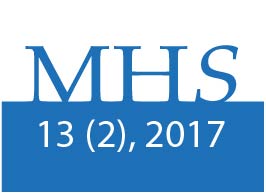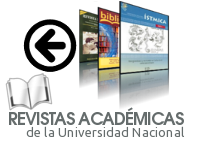AEROBIC AND STRENGTH EXERCISES IN PATIENTS WITH CHRONIC OBSTRUCTIVE PULMONARY DISEASE (COPD): A CASE STUDY
DOI:
https://doi.org/10.15359/mhs.13-2.4Keywords:
physical activity, physiological responses internal load, physical capacityAbstract
This study was aimed at describing the physiological responses of Chronic Obstructive Pulmonary Disease (COPD) patients in each session of an 8-week training program and analyzing its effects on the patients’ physical performance. Four COPD patients (64 ± 6 years) participated in this study. A 6-minute walking test (6MWT) (T1) was performed before the training program to determine the cardiovascular capacity of the participants. After 8 weeks 6MWT was repeated (T2). During the training program participants performed interval aerobic endurance, strength, stretching and respiratory muscle training. There was no significant increase in the physiological variables (systolic and diastolic blood pressure and oxygen saturation) after 6MWT neither in T1 or T2. However, the systolic pressure in the Post test of T1 (∆%=24.8±22.1; ES=2.2, high) and Post test of T2 (∆%=14.0±13.2; ES=1.0, high) reported a tendency to be higher than the Pre test. With respect to physical performance, participants walked slightly more meters after the training sessions (∆%=4.61; ES=0.4, low), which was accompanied by an increased effort perception (∆%=107.1; ES=3.0 and ∆%=200.0; ES=1.8 for RPEmus). Participants slightly improved their physical performance in the 6MWT probably because sessions were not only focused on improving aerobic capacity but also muscle strength.References
Albarrati, A.M., Gale, N.S., Enright, S., Munnery, M.M., Cockcroft, J.R., & Shale, D.J. (2016). A simple and rapid test of physical performance in chronic obstructive pulmonary disease. International Journal of Chronic Obstructive Pulmonary Disease, 11, 1785-1791. https:/doi.org/10.2147/COPD.S106151
Andrianopoulos, V., Klijn, P., Franssen, F.M., & Spruit, M.A. (2014). Exercise training in pulmonary rehabilitation. Clinical Chest Medicine, 35(2), 313-322. https:/doi.org/10.1016/j.ccm.2014.02.013
Bardagi, S. & Solans, M. (2007). Enfermedad pulmonar obstructiva crónica. Prevalencia. Clínica. Tratamiento farmacológico. En E. Pleguezuelos., G. Miranda., A. Gómez & L. Capellas (coords.), Rehabilitación integral en el paciente con enfermedad pulmonar obstructiva crónica (pp. 22-32). Madrid: Editorial Médica Panamericana.
Bernardi, E., Pomidori, L., Bassal, F., Contoli, M., & Cogo, A. (2015). Respiratory muscle training with normocapnic hyperpnea improves ventilatory pattern and thoracoabdominal coordination, and reduces oxygen desaturation during endurance exercise testing in COPD patients. International Journal of COPD, 10, 1899-1906. https:/doi.org/10.2147/COPD.S88609
Bolton, C.H.E., Bevan-Smith, E.F., Blakey, J.D., Crowe, P., Elkin, S.L., Garrod, R., (…) & British Thoracic Society Standards of Care Committee. (2013). British Thoracic Society guideline on pulmonary rehabilitation in adults. Thorax, 68, 1-30. https:/doi.org/10.1136/thoraxjnl-2013-203808
British Thoracic Society Standards of Care Subcommittee on Pulmonary Rehabilitation (2001). BTS Statement: Pulmonary Rehabilitation. Thorax, 56, 827-834. https:/doi.org/10.1136/thorax.56.11.827
Chen, C-A., Chang, C-H., Lin, M-T., Hua, Y-C., Fang, W-Q., Wu, M-H., (…) & Wang, J-K. (2015). Six-minute walking test: normal reference values for taiwanese children and adolescents. Acta Cardiologica Sinica, 31(3), 193-201. doi: 10.6515/ACS20140721D
Chiacchio, M., Omar, A., & Suau, R. (2010).Respuesta de la tensión arterial a la prueba de esfuerzo. Apunts: Medicina de l’esport, 45(167), 191-200. https:/doi.org/10.1016/j.apunts.2010.01.005
Covey, M.K., McAuley, E., Kapella, M.C., Collins, E.G., Alex, C.G., Berbaum, M.L., & Larson, J.L. (2012). Upper-body resistance training and self-efficacy enhancement in COPD. Journal of Pulmonary and Respiratory Medicine, (supl. 9:001). https:/doi.org/10.4172/2161-105X.S9-001
Cohen, J. (1988). Statistical power analysis for the behavioral sciences. New York: Academic Press.
De Moraes Chaves Becker, M., Barbosa e Silva, O., Gonçalves Moreira, I.E., & Guimarães Victor, E. (2007). Pressão Arterial em Adolescentes Durante Teste Ergométrico. Arquivos Brasileiros de Cardiologia, 88, 329-33. https:/doi.org/10.1590/S0066-782X2007000300012
Escarrabill, J. (2005). Indicaciones de la oxigenoterapia domiciliaria en la enfermedad pulmonar obstructiva crónica. En A. Agustí & B. Celli (Ed.), Enfermedad pulmonar obstructiva crónica (pp. 221-228). Barcelona, España: Masson.
Fierro-Carrion, G., & Mahler, D.A. (2002). Exercise prescription for patients with chronic lung disease. Clinical Pulmonary Medicine, 9, 1-5. https:/doi.org/1068-0640/02/0901-001
Fernández-Fernández, F.J., Ameneiros-Lago, E., González, J., Pía, G., Martínez-Debén, F.S., & Sesma, P. (2003). Tratamiento de la enfermedad pulmonar obstructiva crónica. Anales de Medicina Interna, 20(3), 148-155.
Foster, C., Florhaug, J.A., Franklin, J., Gottschall, L., Hrovatin, L.A., Parker, S., Doleshal, P., & Dodge, C. (2001). A new approach to monitoring exercise training. Journal of Strength and Conditioning Research, 15(1), 109–15. https:/doi.org/10.1519/00124278-200102000-00019
García-Aymerich, J. (2005). Situación en España. En A. Agustí & B. Celli (Ed.), Enfermedad pulmonar obstructiva crónica (pp. 19-28). Barcelona, España: Masson.
Global Initiative for Chronic Obstructive Lung Disease [GOLD]. (2016). Global strategy for diagnosis, management, and prevention of chronic obtructive pulmonary disease (updated 2016). Recuperado de http://www.goldcopd.com/
Griffiths, T.L., Burr, M.L., Campbell, I.A., Lewia-Jenkins, V., Mullins, J., Shiels, K., (…) & Tunbridge, J. (2000). Results at 1 year of outpatient multidisciplinary pulmonary rehabilitation: a randomised controlled trial. The Lancet, 355(9201), 362-368. https:/doi.org/10.1016/S0140-6736(99)07042-7
Güell, M.R., Díaz, S., Rodríguez, G., Morante, F., San Miguel, M., Cejudo, P., (…) & Servera, E. (2014). Rehabilitación respiratoria. Archivos de Bronconeumología, 50(8), 332-344. https:/doi.org/10.1016/j.arbres.2014.02.014
Harris, D.J. & Atkinson, G. (2013). Ethical standards in sport and exercise science research: 2014 update. International Journal of Sports Medicine, 34, 1025-1028. https:/doi.org/10.1055/s-0033-1358756
Iepsen, U.W., Jorgensen, K.J., Ringbaek, T., Hansen, H., Skrubbeltrang, C., & Lange, P. (2015). A combination of resistance and endurance training increases leg muscle strenght in COPD: An evidence-based recommendation based on systematic review with meta-analyses. Chronic Respiratory Disease, 12(2), 132-145. https:/doi.org/10.1177/1479972315575318
Karvonen, J. & Vuorimaa, T. (1988). Heart rate and exercise intensity during sports activities: practical application. Sports Med, 5(5), 303–11.
Lacasse, Y., Goldstein, R., Lasserson, T.J. & Martin, S. (2006). Pulmonary rehabilitation for chronic obstructive pulmonary disease. Cochrane Database System Review, (4), CD003793. https:/doi.org/10.1002/14651858.CD003793.pub2
Mador, M.J., Bozkanat, E., Aggarwal, A., Shaffer, M., & Kufel, T.J. (2004). Endurance and strength training in patients with COPD. Chest, 125(6), 2036–2045. https:/doi.org/ 10.1378/chest.125.6.2036
Martin, D., Powers, S., Cicale, M., Collop, N., Huang, D., & Criswell, D. (1992). Validity of pulse oximetry during exercise in elite endurance athletes. Journal of Applied Physiology, 72, 455-8.
Mayer, A.S., & Maier, L.A. (2010). Evaluation of respiratory impairment and disability. En: R.J. Mason, V.C. Broaddus, T.R. Martin, T.E. King, D.E. Schraufnagel, J.F. Murray & J.A. Nadel (eds.), Murray and Nadel's Textbook of Respiratory Medicine 5º ed. Philadelphia, PA: Saunders Elsevier.
Menezes, A.M.B. & Knorst, M. (2005). Situación en América Latina. En A. Agustí & B. Celli (Ed.), Enfermedad pulmonar obstructiva crónica (pp. 29-44). Barcelona, España: Masson.
Montes, M. (2011). Bronquitis crónica en la EPOC: prevalencia e impacto sobre la enfermedad. Medicina respiratoria, 4(2), 57-64.
Nakamura, Y., Tanaka, K., Shigematsu, R., Nakagaichi, M., Inoue,
M., & Homma, T. (2008). Effects of aerobic training and recreational activities in patients with chronic obstructive pulmonary disease. International Journal of Rehabilitation Research, 31(4), 275–283.https:/doi.org/10.1097/MRR.0b013e3282fc0f81
Ortega, F., Toral, J., Cejudo, P., Villagomez, R., Sánchez, H., Castillo, J., & Montemayor, T. (2002). Comparison of effects of strength and endurance training in patients with chronic obstructive pulmonary disease. American Journal of Respiratory and Critical Care Medicine, 166(5), 669–674. https:/doi.org/10.1164/rccm.2107081
O’Shea, S.D., Taylor, N.F., & Paratz, J.D. (2007). Qualitative outcomes of progressive resistance exercise for people with COPD. Chronic Respiratory Disease, 4, 135-142. https:/doi.org/10.1177/1479972307075313
Panton, L.B., Golden, J., Broeder, C.E., Browder, K.D., Cestaro-Seifer, D.J. & Seifer, F.D. (2004). The effects of resistance training on functional outcomes in patients with chronic obstructive pulmonary disease. Eur J Appl Physiol, 91(4), 443–449. https:/doi.org/ 10.1007/s00421-003-1008-y
Puhan, M.A., Busching, G., Schunemann, H.J., VanOort, E., Zaugg, C., & Frey, M. (2006). Interval versus continuous high-intensity exercise in chronic obstructive pulmonary disease: a randomized trial. Annals of Internal Medicine, 145, 816–825.
Rieger, C., Garcia, F. J., Rubio, F. J., & Marin, J. M. (2014). Classification of chronic obstructive pulmonary disease severity according to the new Global Initiative for Chronic Obstructive Lung Disease 2011 guidelines: COPD assessment test versus modified Medical Research Council scale. Archivos de Bronconeumología, 50(4), 129-134. https:/doi.org/10.1016/j.arbres.2013.09.014
Rocha Leite, M., Cipulo Ramos, E.M., Kalva-Fulho, C.A., Coelho Figueira Freire, A.P., Spolador de Alencar Silva, B., Nicolino, J., (…) & Ramos, D. (2015). Effects of 12 weeks of aerobic training on autonomic modulation, mucociliary clearance, and aerobic parameters in patients with COPD. International Journal of COPD, 10, 2549-2557. https:/doi.org/10.2147/COPD.S81363
Saglam, M., Vardar-yagli, N., Calik-kutukcu, E., Arikan, H., Savci, S., Inal-ince, D., (…), & Tokgozoglu, L. (2015). Functional exercise capacity, physical activity, and respiratory and peripheral muscle strength in pulmonary hypertension according to disease severity. Journal of Physical Therapy Science, 27, 1309–1312. https:/doi.org/: 10.1589/jpts.271309.
Skinner, J.S. (2005). Exercise Testing and Exercise Prescription for Special Cases. Theoretical Basis and Clinical Application. 3°ed. Lippincott: Williams & Wilkins.
Spruit, M.A., Singh, S.J., Garvey, C., ZuWallack, R., Nici, L., Rochester, C., (…) & ATS/ERS Task Force on Pulmonary Rehabilitation. (2013). An Official American Thoracic Society/European Respiratory Society Key concepts and advances in pulmonary rehabilitation. American Journal of Respiratory and Critical Care Medicine, 188, 213-264. https:/doi.org/ 10.1164/rccm.201309-1634ST
Troosters, T., Gosselink, R., & Decramer, M. (2000). Short- and long-term effects of outpatient rehabilitation in patients with chronic obstructive pulmonary disease: a randomized trial. The American Journal of Medicine, 109, 207-12.
Troosters, T., Gosselink, R., Janssens, W., & Decramer, M. (2010). Exercise training and pulmonary rehabilitation: new insights and remaining challenges. European Respiratory Review, 19, 24–29. https:/doi.org/10.1183/09059180.00007809
Vargas, O.C. (2003). Entrenamiento físico en enfermedad respiratoria crónica. Revista ciencias de la salud, 1(2), 180-189.
Viejo, J.L. (2005). Tratamiento farmacológico. En A. Agustí & B. Celli (Ed.), Enfermedad pulmonar obstructiva crónica (pp. 163-174). Barcelona, España: Masson.
Vonbank, K., Strasser, B., Mondrzyk, J., Marzluf, B.A., Richter, B., Losch, S., (…) & Haber, P. (2012). Strength training increases maximum working capacity in patients with COPD – randomized clinical trial comparing three training modalities. Respiratory Medicine, 106(4), 557–563. https:/doi.org/10.1016/j.rmed.2011.11.005
Wadell, K., Webb, K.A., Preston, M.E., Amornputtisathaporn, N., Samis, L., Patelli, J., (…) & O’Donnell, D.E. (2013). Impact of pulmonary rehabilitation on the major dimensions of dyspnea in COPD. COPD, 10(4), 425-435. https:/doi.org/10.3109/15412555.2012.758696
Downloads
Published
How to Cite
Issue
Section
License
General conditions
MHSalud: Journal in Human Movement Sciences and Health by the Universidad Nacional is cover under a Creative Commons Atribución-NoComercial-SinDerivadas 3.0 Costa Rica license.
The journal is hosted in open access repositories such as the Institutional Repository of the Universidad Nacional, the Kimuk Repository of Costa Rica and La Referencia.
The editorial source of the journal must be recognized. Use the doi identifier for this purpose.
Self-archiving policy: The journal allows the self-archiving of the articles in their peer-reviewed version, edited and approved by the Editorial Board of the Journal to be available in Open Access through the Internet. More information in the following link: https://v2.sherpa.ac.uk/id/publication/25815



















